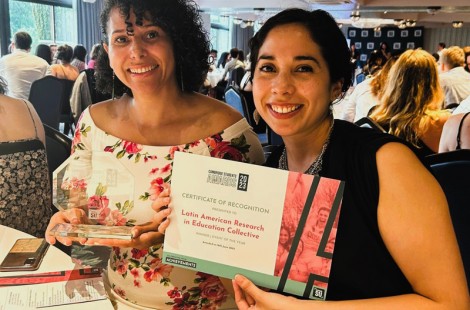
A Murray Edwards student who threw open the doors of a Cambridge University college to welcome in the city’s local community has been honoured with an award.
Heidy M. Perez-Cordero, a Puerto Rican-Dominican doctoral student at the university’s Faculty of Education, co-organised the ‘II Freire’ Conference – a Latin American-inspired ‘community takeover’. The event saw local activists, enterprises, artists, charities and community groups join with academics to exchange ideas on tackling inequality in Cambridge, which has been identified as the least equal city in the UK.
The takeover, based on the ideas the influential Brazilian educator Paulo Freire, was named Event of the Year in the first Cambridge Students' Awards, organised by Cambridge Student Union. The awards, which attracted over 230 nominations for ten categories, recognise the contribution of students and their organisations both locally and internationally.
More than 2,000 people participated in the online and in-person education conference, held in October 2022 in both Brazil and Cambridge with simultaneous interpretation in Brazilian Sign Language, Portuguese, English and Spanish. In Cambridge, Faculty of Education students transformed part of neighbouring Homerton College into an open, shared space for the day, allowing community representatives and academics to meet to discuss local issues and begin collaborations to achieve positive change in the area.
There were also exhibitions by local artists’ and crafts people, and a sarau – a gathering aimed at sharing different cultural traditions and ideas through dance, music, performance and poetry.
As well as jointly organising the Cambridge side of the event, Heidy, a member of Cambridge Latin American Research in Education Collective, ran a creativity workshop at Murray Edwards open to anyone in the city. Harriet Loffler, curator of the College’s Women's Art Collection, gave a tour of the artworks.
The event was the first time Freire’s ideas on ‘popular education’ - a familiar concept in Latin America - have been tried at a British university. Unlike formal education that takes place in schools, popular education – which involves adults as well as children – is shaped by the participants themselves. It often starts from people’s personal experiences of various political and social problems, and aims to empower them to work together towards solutions. Everyone teaches and learns from each other as they strive towards these goals.
The Cambridge event has been particularly inspired by Rede Emancipa: a Brazilian social justice movement which defends the right to education for all. A simultaneous ‘takeover’ took place at the Federal University of Rio de Janeiro, with the two institutions linking up through a live stream. The Cambridge side involved groups such as Arthur Rank Hospice, Cambridge Ethnic Community Forum, the Karim Foundation and Cambridge Women’s Resources Centre, and focused on ways to address local difficulties with inequality, marginalisation and social exclusion. Cambridge has been identified as Britain’s least equal city. Although it is extremely prosperous thanks to its universities and the closely-linked tech and biomedical clusters, the top 6% of earners take home almost one fifth of the income generated, while the bottom 20% earn just 2% of the total.
Heidy said the prize-giving ceremony had proved highly emotional. “Tears welled up because the II Freire’s Conference was the result of the love, true solidarity and dedication of many people. Walking down the middle of the aisle to pick up the trophy and certificate was like walking with each one of the people who worked hard and are highly dedicated in promoting and practising popular education, democratic education, and social justice. We walked that distance for every Latin American who has never been recognised in this very Eurocentric part of the world.”
Heidy’s own research explores the formation of the professional identity of migrant language teachers in Cambridge, using a series of applied drama workshops.
Photo shows Heidy M. Perez-Cordero (left) and conference co-organiser Rocío Fernández Ugalde (right). Alexandre da Trindade was also part of the organisation team but is currently working in Brazil.